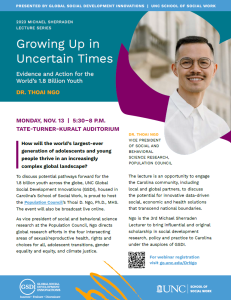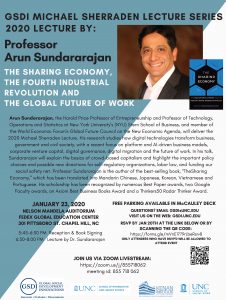Michael Sherraden Lecture Series
November 13th, 2023 |
|
3rd Michael Sherraden LectureClick here to learn more about attending for continuing education credits. Reception: 5:30–6:30 p.m. | Lecture: 6:30–7:15 p.m. How will the world’s largest-ever generation of adolescents and young people thrive in an increasingly complex global landscape? To discuss potential pathways forward for the 1.8 billion youth globally, GSDI is proud to host the Population Council’s Thoai D. Ngo, Ph.D., MHS, on November 13, 2023. The event will also be broadcast live online. As vice president of social and behavioral science research at the Population Council, Dr. Ngo directs global research efforts in the four intersecting areas of sexual and reproductive health, rights and choices for all, adolescent transitions, gender equality and equity, and climate justice. The lecture is an opportunity to engage the Carolina community, including global and local partners, to discuss the potential for innovative, data-driven social, economic, and health solutions that transcend national boundaries. Dr. Ngo is the 3rd Michael Sherraden Lecturer to bring influential and original scholarship in social development research, policy, and practice to Carolina under the auspices of GSDI. This is a hybrid event. For In-Person attendees, food and networking start at 5:30 p.m. The lecture will begin at 6:30 p.m. |
 |
20202nd Michael Sherraden LectureProfessor Arun Sundararajan delivered GSDI’s 2nd Michael Sherraden Lecture on January 23, 2020. Dr. Arun Sundararajan, the Harold Price Professor of Entrepreneurship and Professor of Technology, Operations and Statistics at New York University’s (NYU) Stern School of Business, and member of the World Economic Forum’s Global Future Council on the New Economic Agenda, discussed how digital technologies transform business, government, and civil society. Sundararajan’s research focuses on platform and AI-driven business models, corporate venture capital, digital governance, digital migration, and the future of work. Watch the recorded Michael Sherraden Lecture Series here. Watch a short interview with Professor Sundararajan here. The 2020 Lecture was made possible through collaboration and contributions from the UNC School of Social Work, the UNC Kenan Institute, and the UNC School of Information and Library Science. |
|

